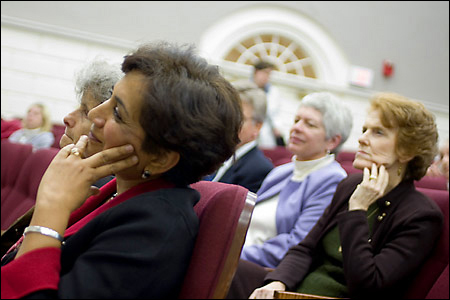Geeta Rao Gupta receives Anne Roe Award from GSE
You would not expect someone being honored with an award named for the first woman tenured in the Harvard Faculty of Education to be even a bit down on education for women.
But in her presentation, “Unlocking the Power of Women: Is Education the Key?” Geeta Rao Gupta was clear: “Education, I would like to argue, is only one of the ingredients necessary to bring about women’s empowerment – it is a necessary, even essential, but not sufficient condition for that magical outcome that allows an individual to feel confident and in control of her own life and its outcomes.”

Rao Gupta is the director of the private nonprofit International Center for Research and Women, in Washington, D.C., and is a leading authority on women’s role in development and on women and HIV/AIDS.
Women’s empowerment, Rao Gupta maintained, has two components: resources, including access to education and economic assets, and agency. And it is agency that is “the defining characteristic of empowerment,” she said. “It refers to the ability to make strategic choices; not just to have access to resources but to be able to draw upon them, control them, and make decisions that affect important life outcomes.”
She stressed, though, that what she is calling for is not a zero-sum game: “Empowering women does not disempower men. Power is not a finite commodity.”
She spoke at the Harvard Graduate School of Education on Oct. 25 before being given the biennial award established in 1979 to honor Anne Roe, tenured in 1963, a leading researcher on the development of careers for women.
“My choice of career,” Rao Gupta told her audience in Askwith Hall, “has a lot to do with the fact that I grew up in India, a land that is as well known for its economic growth and enormous potential, as it is for the injustices and inequities experienced by its women and poor.
“How could any thinking woman growing up in India be blind to the inequities experienced by women and not have an anger deep in her belly about the indignities and injustices that women in poor communities have to bear? How could one not be moved from anger to action?”
She spoke with the rapid-fire delivery of a woman in a hurry to change lives around the world.
“Generating agency requires a process that stimulates participation and inclusion and recognizes women as agents of change in their own lives,” she said. “As a result, any discussion of empowerment emphasizes the process of engaging people more than the content of what is done with them. Proponents of empowerment reject a top-down approach to development and value the mobilization of the disempowered and their participation in solving problems.”
Globalization has benefited women in many ways, she said. But gender gaps remain in education, especially secondary education. “And although female employment has increased in most regions of the world, the vast majority of women still work in low-paying, seasonal, and insecure jobs in the informal and semiformal sector of the labor market.”
Women’s life expectancy has increased in recent decades, and fertility rates have tumbled – but a “staggering” half a million women die in childbirth every year, overwhelmingly in the developing world.
She hailed the efforts of organizations like the Grameen Bank, recently awarded the Nobel Prize, to empower women. But she suggested pointedly that their effectiveness is being measured by the wrong yardstick – their typically high loan repayment rates. These, she suggested, reflect mostly women’s tendency to play by the rules.
Rather, she suggested, “Microfinance programs should measure their success by the size of women’s loans over time and whether a substantial proportion of women borrowers graduate from microcredit to formal credit channels and from micro-enterprise to small- and medium-sized businesses.”
She stressed the importance of her family: “I was blessed to be born into an Indian family of strong and remarkable women and unusually supportive and progressive men – all of whom, incidentally, were educators in one way or the other and believed in the value of education almost as intensely as other families do religion.”
Her grandfather, she went on to explain, was the recipient of perhaps one of the first vasectomies in India, in 1932, which enabled her grandmother to end her childbearing after six children in seven years, and begin her university education.
She called for changes in public attitudes. “The good news is that, like economic institutions, sociocultural institutions are not immutable – they are flexible and dynamic – their rules and boundaries after all are created by people and so changes can be, and often are, negotiated,” she said, going on to cite the American experience and connect the dots from Rosie the Riveter to Title IX by way of Betty Friedan.
Investing in women is not only the right thing to do, it’s the smart thing to do, Rao Gupta told her audience. She quoted The Economist: “Women are now the most powerful engine of global growth – forget China, India, and the Internet: Economic growth is driven by women.”




